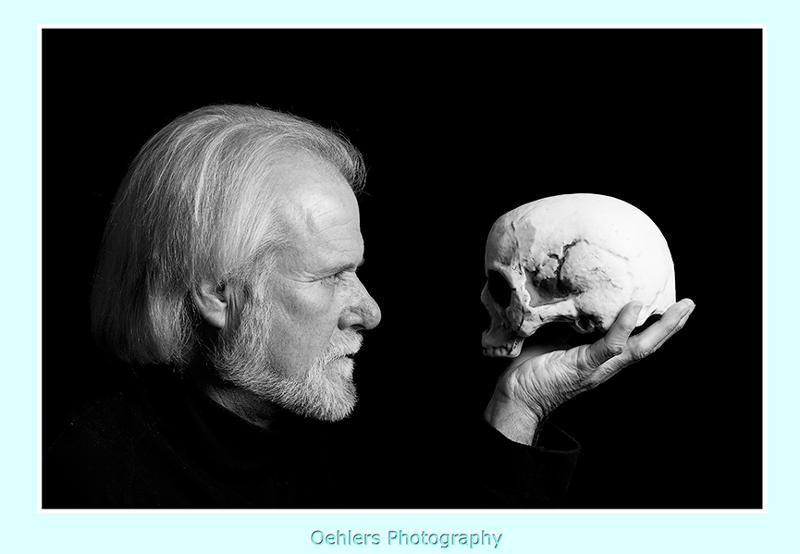Is this the origin of the phrase "painting it on a bit thick" ?
Alas, poor Yorick (alas P&R)! I knew him (it), Horatio (well)
Meaning
A meditation on the fragility of life.
Hamlet says this in a graveyard as he looks at the skull of Yorick, a court jester he had known as a child, and grieves for him. In this complex speech, which is one of the best known in all dramatic works, Hamlet goes on to consider the fate of us all when he compares the skull to those still living: "let her paint [her face] an inch thick, to this favour [state] she must come”
As a child Hamlet found the jester Yorick amusing and entertaining. They used to play and frolic in an intimate but innocent way. Now that Yorick is a smelly corpse the memory of touching him seems revolting and makes Hamlet feel ill.
Origin
From Shakespeare's Hamlet, 1602. Often misquoted for some reason as 'Alas poor Yorick, I knew him well'.
HAMLET:
Alas, poor Yorick! I knew him, Horatio: a fellow
of infinite jest, of most excellent fancy: he hath
borne me on his back a thousand times; and now, how
abhorred in my imagination it is! my gorge rims at
it. Here hung those lips that I have kissed I know
not how oft. Where be your gibes now? your
gambols? your songs? your flashes of merriment,
that were wont to set the table on a roar? Not one
now, to mock your own grinning? quite chap-fallen?
Now get you to my lady's chamber, and tell her, let
her paint an inch thick, to this favour she must
come; make her laugh at that.
http://www.phrases.org.uk/meanings/25500.html

ASKER CERTIFIED SOLUTION
membership
This solution is only available to members.
To access this solution, you must be a member of Experts Exchange.
SOLUTION
membership
This solution is only available to members.
To access this solution, you must be a member of Experts Exchange.
SOLUTION
membership
This solution is only available to members.
To access this solution, you must be a member of Experts Exchange.
Pretty unlikely. "laying it on a bit thick" means to exagerate, whereas Hamlet is referring to Ophelia's makeup.
ASKER
n2fc,
Thanks. I do enjoy knowing the roots of words.
--
Collandor,
Yes. I think you're right. I mis-remembered the phrase. If it was painting and not laying it on a bit thick I'd expect to find a google hit for 'paint/painting it on a bit thick.' Possibly, I have mis-used it myself and that is how it came to my mind in this question.
... the image came to me as I was writing, about the old old style original first stage actors who used to really slap on the make-up in a very exaggerated fashion.
--
WaterStreet,
Good points.
Your talk of metaphors reminded me of the book by Julian Jaynes, The Origins of Consciousness in the Breakdown of the Bicameral Mind -link to Amazon. I haven't read it all but there is an extract on metaphors and how, he asserts, that all language is built from the use of metaphors.
Julian Jaynes (1993), The Origin of Consciousness in the Breakdown of the Bicameral Mind, p.51 - link to julianjaynes.org
--
andyalder,
just on your point and not my question,
...just reading from the extract I pasted, isn't he telling the Skull of Yorick to act as he did as a jester and make her laugh at that. So isn't the suggestion that such an action is an exaggeration not, for instance, a simple command to make herself pretty?
Thanks. I do enjoy knowing the roots of words.
--
Collandor,
Yes. I think you're right. I mis-remembered the phrase. If it was painting and not laying it on a bit thick I'd expect to find a google hit for 'paint/painting it on a bit thick.' Possibly, I have mis-used it myself and that is how it came to my mind in this question.
... the image came to me as I was writing, about the old old style original first stage actors who used to really slap on the make-up in a very exaggerated fashion.
--
WaterStreet,
Good points.
Your talk of metaphors reminded me of the book by Julian Jaynes, The Origins of Consciousness in the Breakdown of the Bicameral Mind -link to Amazon. I haven't read it all but there is an extract on metaphors and how, he asserts, that all language is built from the use of metaphors.
Even such an unmetaphorical-sounding word as the verb 'to be' was geberated from a metaphor. It comes from the Sanskrit bhu, 'to grow, or make grow,' while the English forms 'am' and 'is' have eveolved from the same root as the sanskrit asmi, 'to breathe.' It is thus something of a lovely surprise that our most nondescript verb is thus a record of a time when man had no independent word for 'existence' and could only say that something 'grows' or that it 'breathes.' Of course we are not conscious of that the concept of being is thus generated from a metaphor about growing and breathing.
Julian Jaynes (1993), The Origin of Consciousness in the Breakdown of the Bicameral Mind, p.51 - link to julianjaynes.org
--
andyalder,
just on your point and not my question,
...just reading from the extract I pasted, isn't he telling the Skull of Yorick to act as he did as a jester and make her laugh at that. So isn't the suggestion that such an action is an exaggeration not, for instance, a simple command to make herself pretty?
ASKER
Thanks,
Some examples of 'paint' in phrases,
http://www.phrases.org.uk/search.html?cx=partner-pub-1661211094230592%3Aj0ovos3kcvj&cof=FORID%3A10&ie=ISO-8859-1&q=paint&siteurl=www.phrases.org.uk%2F
Some examples of 'paint' in phrases,
http://www.phrases.org.uk/search.html?cx=partner-pub-1661211094230592%3Aj0ovos3kcvj&cof=FORID%3A10&ie=ISO-8859-1&q=paint&siteurl=www.phrases.org.uk%2F